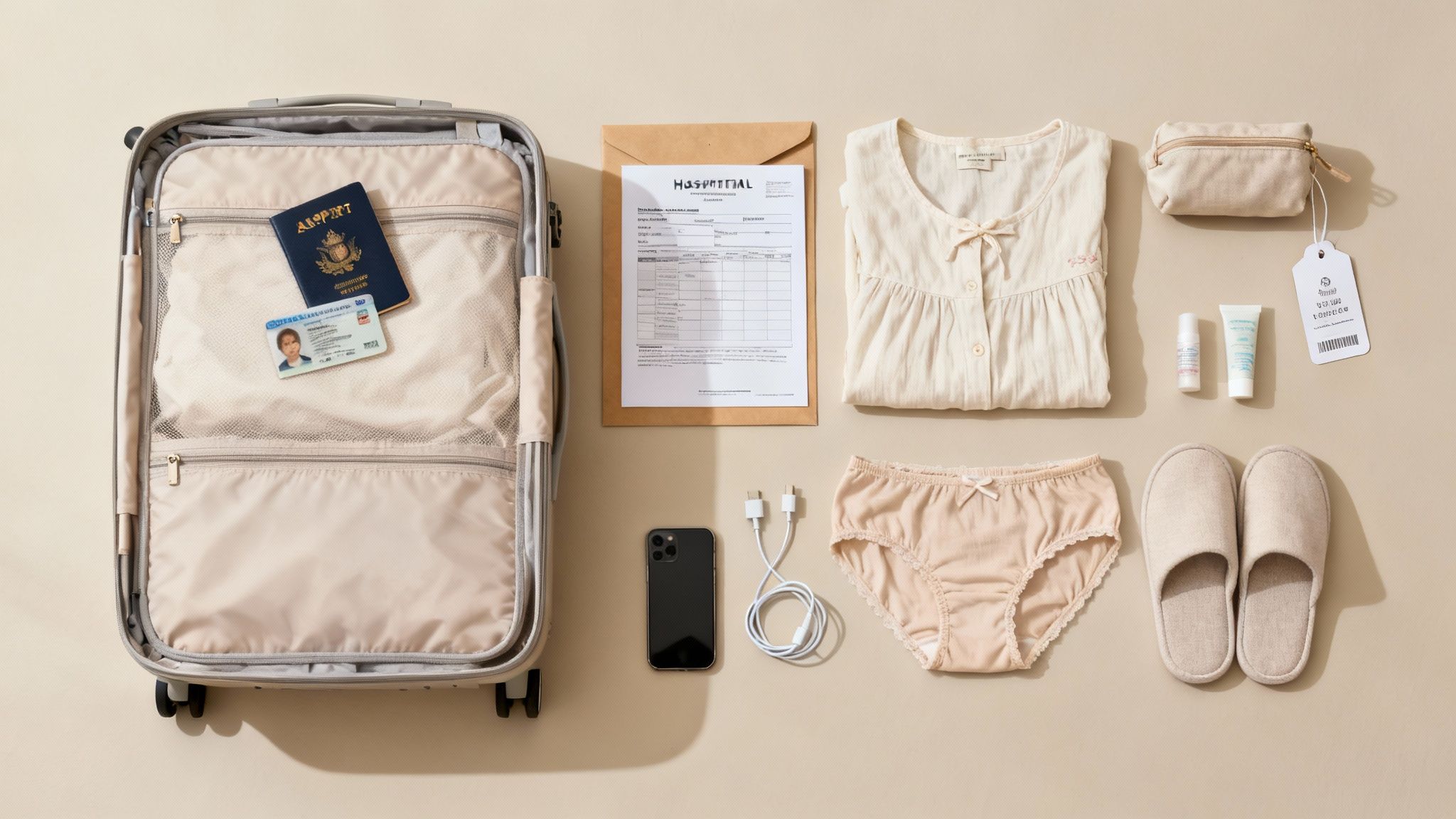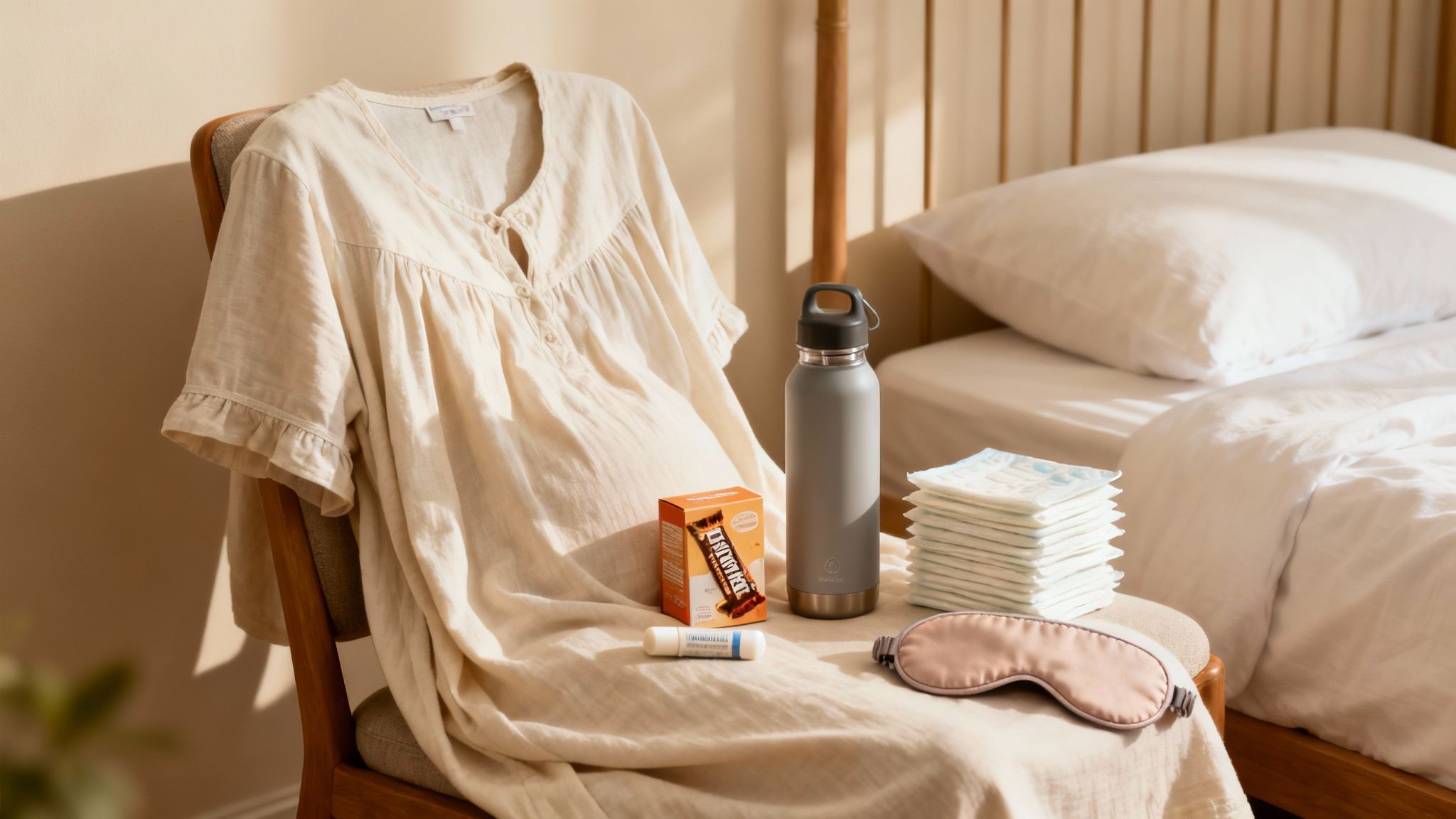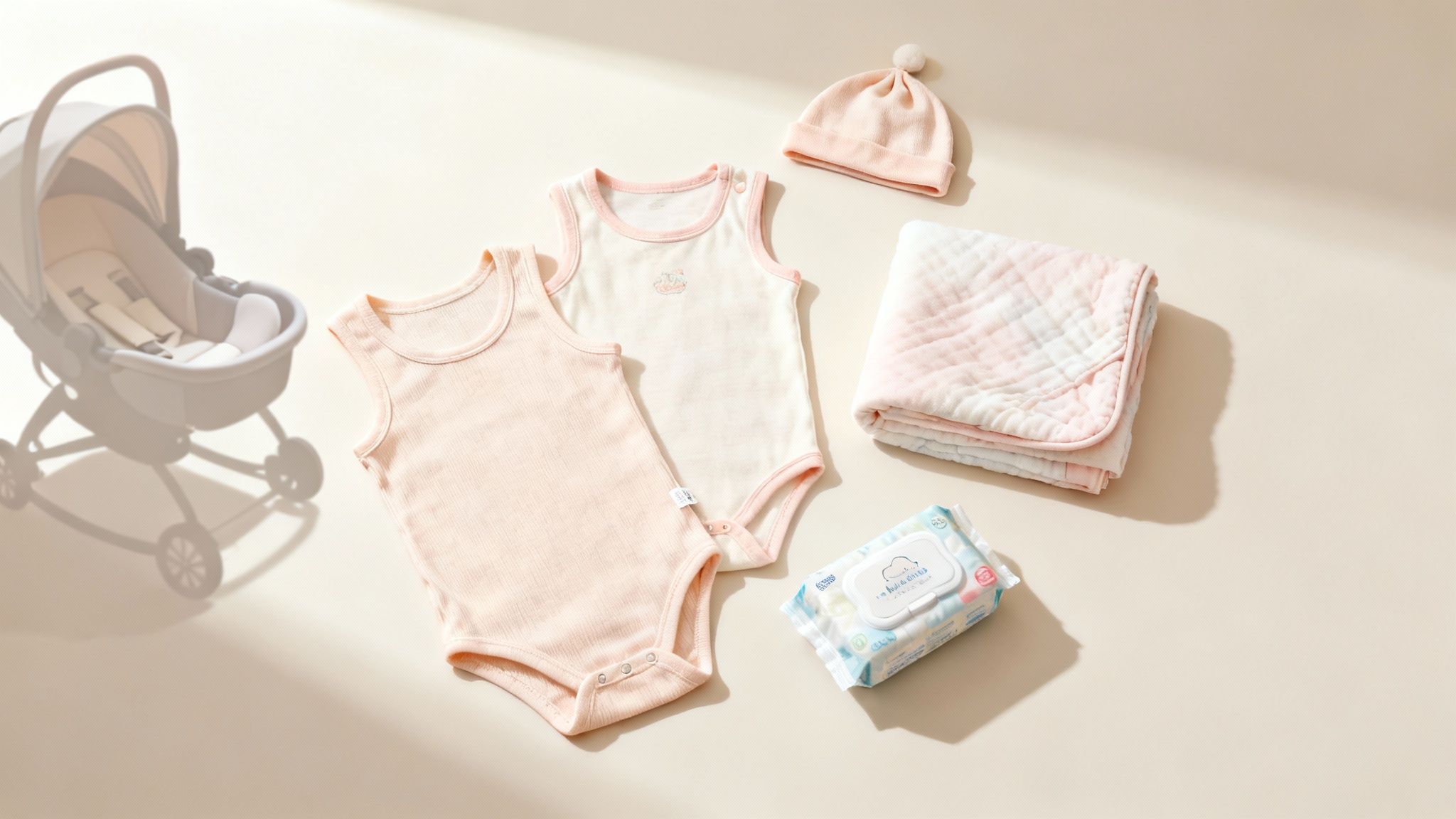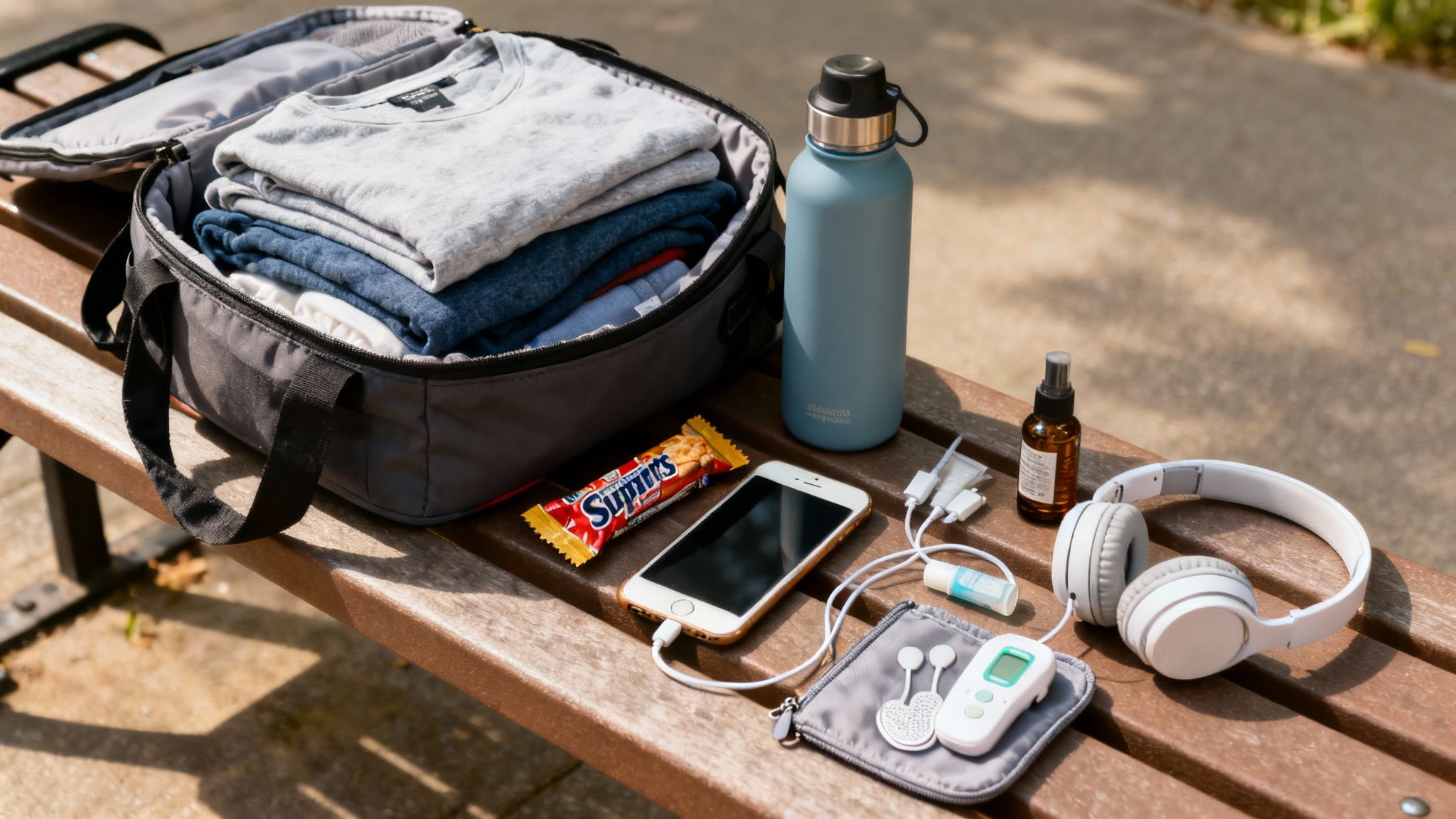
What to pack in a hospital bag for birth: Ultimate checklist
Share
Packing for your baby's arrival is an exciting milestone. However, figuring out what to pack in your hospital bag can feel like a huge task. The secret is to keep it simple.
Here is why. You should think about three key areas: essentials for your labour and recovery, must-haves for your newborn, and practical things for your support person. A well-packed bag brings comfort and calm to the big day. This lets you focus on what really matters - you will not need to bring one of our linen baby play mats with you to the hospital.
Your Essential Hospital Bag Checklist for an Australian Birth

Does the packing list feel a little overwhelming? Let's break it down. Instead of one giant suitcase, think of your hospital bag as a kit for a big adventure. The goal here is practicality, not packing everything you own.
This guide will walk you through the must-haves for your hospital stay in Australia. We will cover the non-negotiables for you, your baby, and your partner. We will focus on what will actually make a difference.
Why Planning Ahead Matters
Having your bags packed by the 36-week mark brings incredible peace of mind. It is one less thing to scramble for when contractions start. It also empowers your support person. They can easily find what you need without asking many questions while you are trying to breathe.
A little organisation now makes for a much smoother, calmer experience.
A thoughtfully packed bag is more than a collection of items. It’s a tool that helps you feel prepared, in control, and comfortable during a powerful experience. It’s your personal support kit for the journey ahead.
So, let's get into it. We will cover everything from important documents and comfy postpartum clothes to your baby’s first outfit. If you are in full prep mode, our complete newborn checklist for Australia is another great resource for making sure you have everything ready at home.
To kick things off, the table below gives a quick look at the basics. Use this as your starting point. We will dive deeper into each category in the sections to come.
At-a-Glance Hospital Bag Essentials
Here’s a quick summary of the non-negotiable items for mum, baby, and partner. This will ensure you have the basics covered.
| For Mum | For Baby | For Partner/Support Person |
|---|---|---|
| Birth plan & hospital paperwork | 2-3 bodysuits/onesies | Change of clothes |
| Comfy clothes for labour/postpartum | Nappies and wipes | Snacks and a reusable water bottle |
| Toiletries (travel-sized) | 2 swaddles or sleeping bags | Phone and charger |
| Maternity pads & nursing bras | Going-home outfit | Something to pass the time (book, headphones) |
| Phone, charger, and headphones | Car seat correctly installed | Toiletries |
This table covers the absolute essentials. Keep reading for a more detailed breakdown and a few extra comforts you might want to consider.
Packing for Your Comfort During Labour and Recovery

Labour and birth ask a lot of your body. Those first few days of recovery are just as demanding. Packing your bag with comfort in mind is a practical way to support yourself through this process. Think of it as creating a personal care kit that helps you feel grounded and more like yourself.
Let's break it down into two parts. First, things that will support you during labour. Second, essentials for your postpartum recovery. This helps you think about the journey in stages, making sure you have the right things at the right time.
Creating a Soothing Labour Environment
Your main goal during labour is to stay as relaxed and comfortable as possible. The hospital provides clinical necessities. Your personal items create an atmosphere of calm.
Here are a few things that can make a huge difference:
- Loose-Fitting Clothing: A comfy, dark-coloured nightie or an oversized t-shirt is perfect. You will want something you can move in easily and will not mind getting messy.
- A Cosy Dressing Gown: Hospitals can get chilly. A familiar dressing gown is perfect for walking the halls in early labour or for extra warmth and privacy.
- Slippers or Non-Slip Socks: Hospital floors are cold and can be slippery. A pair of easy-to-slip-on slippers or socks with grips will keep you comfortable and safe.
These simple items bring a sense of normalcy and control. They help you feel more at ease as you navigate contractions.
Essential Items for Postpartum Recovery
After your baby arrives, the focus shifts to healing and bonding. Your body has just done something amazing, and it needs gentle care. Having the right supplies on hand makes this recovery period smoother.
Here’s why these items are non-negotiable for your recovery kit:
- Maternity Pads: The hospital will have these, but many women prefer their own brand. Pack at least one full packet of heavy-duty maternity pads.
- High-Waisted Underwear: You will want several pairs of comfortable, dark-coloured, high-waisted cotton underwear. They need to be big enough to hold a maternity pad securely and sit above any potential C-section incision.
- Comfortable Postpartum Clothes: Pack loose, soft pants like joggers or pyjama bottoms and a few comfortable tops. If you plan to breastfeed, button-down shirts or nursing tops are practical.
Your postpartum body needs time and gentle support to heal. Packing items specifically for your recovery is a powerful act of self-care that acknowledges the physical journey you’ve just been on.
For immediate relief from perineal discomfort after birth, you might want to include a postpartum numbing spray in your toiletry bag. It can provide welcome relief in those first few days.
Personal Care and Creature Comforts
Feeling clean and refreshed can do wonders for your mental state. Packing a small bag with your favourite toiletries is a simple way to feel more human. A survey from Pregnancy, Birth and Baby found that most Australian women packed personal toiletries. This shows how important these little things are.
(Source: What to take to hospital checklist, Pregnancy, Birth and Baby, 25 October 2021)
The same survey revealed that many women prioritised comfort items like a dressing gown and slippers. This reinforces how much packing for your wellbeing matters. You can discover more insights on the Pregnancy, Birth and Baby website.
Here are the key personal items to pop in your bag:
- Your Toiletry Basics: Toothbrush, toothpaste, deodorant, shampoo, conditioner, and soap. Travel-sized versions save space.
- Skincare Essentials: Your face wash, moisturiser, and lip balm are must-haves. Hospital air can be very dry.
- Hair Care: A hairbrush and hair ties are essential for keeping your hair out of your face.
- Your Own Towel: Hospital towels are often small and scratchy. Bringing a dark-coloured towel from home is a simple luxury you will appreciate after that first postpartum shower.
- Energy-Boosting Snacks: Labour can be long, and you might get hungry at odd hours. Pack snacks like muesli bars, dried fruit, and nuts to keep your energy up.
Everything Your Newborn Baby Will Need

Now for the best bit: packing for your tiny new arrival. It is tempting to bring every adorable outfit you have. But for the first few days, practicality is everything. Your baby's needs are simple: to be kept warm, clean, and comfortable.
Let's break down what to pack for your baby into clothing, hygiene, and comfort items. This makes the task much more manageable.
Newborn Essentials Breakdown
Here’s a quick table to help you organise your baby’s hospital bag. It covers the essentials for a typical 2 to 4 day stay in an Australian hospital. It also explains why each item is important for those first days.
| Item Category | Specific Items | Recommended Quantity | Why It's Important |
|---|---|---|---|
| Clothing | Bodysuits/Singlets | 4-5 | A soft base layer to keep baby’s core warm. |
| Onesies (Growsuits) | 4-5 | Full-body outfits for warmth; zippers are a lifesaver for night changes. | |
| Going-Home Outfit | 1 | A special, comfortable outfit for their first big trip. | |
| Hygiene | Newborn Nappies | Approx. 32+ (8-10 per day) | Newborns need frequent changes to keep their skin healthy. |
| Gentle Wipes | 1 large pack | For sensitive skin during nappy changes. | |
| Nappy Rash Cream | 1 small tube | A barrier cream to prevent any irritation before it starts. | |
| Burp Cloths | 3-4 | Essential for spills, spit-up, and protecting your clothes. | |
| Comfort | Swaddles/Wraps | 2-3 | Helps your baby feel secure and cosy, mimicking the womb. |
| Beanie & Socks | 1 beanie, 2-3 pairs of socks | Crucial for regulating body temperature, especially after birth. | |
| Soft Blanket | 1 | For extra warmth and comfort, particularly on the way home. | |
| Safety | Car Seat | 1 (properly installed) | A non-negotiable safety essential for the journey home. |
This checklist should cover everything you need to keep your newborn snug.
Essential Clothing For Your Newborn
A newborn’s skin is delicate. They cannot regulate their body temperature yet. This is why soft, breathable layers are your best friend. Always opt for natural fibres like cotton that are gentle on their skin.
Here are the clothing must-haves:
- Singlets or Bodysuits: Pack 4-5 of these. Bodysuits with snaps at the crotch are fantastic for keeping their torsos warm.
- Onesies (Growsuits): You will want 4-5 full-length onesies. Look for ones with built-in feet and fold-over mittens. Zippers are far easier to manage than tiny snaps during 3 am nappy changes.
- A Going-Home Outfit: Choose one special outfit that’s both comfortable and weather-appropriate for their first trip home.
A great tip is to pack a couple of different sizes, like 0000 and 000. You never know exactly how big your little one will be. Having options means you are guaranteed a snug fit from day one.
Hygiene Must-Haves
Newborns go through a surprising number of nappies. The hospital will have some on hand. Still, it is a good idea to bring your own, especially if you have a preferred brand.
Here’s your hygiene checklist:
- Newborn Nappies: Plan for 8-10 nappies per day. For an average 2 to 4 day hospital stay in Australia, a pack of at least 32 nappies is a safe bet.
- Wipes: A large packet of gentle, water-based, or fragrance-free wipes is perfect for sensitive newborn skin.
- Nappy Rash Cream: Keep a small tube of protective barrier cream on hand, just in case any redness appears.
- Burp Cloths: Pack 3-4 soft muslin or cotton cloths. They are lifesavers for catching spills and protecting your clothes.
Having these items ready will make clean-ups feel less chaotic. This lets you soak up more of those precious newborn snuggles.
Warmth, Comfort, and The Journey Home
Beyond basics, a few key items will help your baby feel secure. These items are all about recreating the cosiness of the womb.
Once you have nailed hospital packing, you can dream up a calm space at home with our guide to newborn nursery ideas.
Here are the final pieces for your baby’s bag:
- Swaddles or Wraps: Bring 2-3 large, lightweight swaddles. Swaddling helps newborns feel safe and secure, which can lead to better sleep.
- Beanie and Socks: A soft beanie helps your baby maintain their body temperature right after birth. A few pairs of tiny socks will keep their feet toasty.
- A Soft Blanket: Hospitals provide blankets. But bringing one of your own is lovely for extra warmth or for tucking around them on the trip home.
Finally, the most important item for leaving the hospital is a properly installed car seat. This is a non-negotiable safety requirement. Make sure you have it fitted correctly well before your due date.
How Your Partner Can Pack to Be the Best Support

Your support person is your rock during labour, birth, and the first postpartum hours. To be the best coach, they need to look after themselves. That means packing their own bag with everything they need to stay energised and comfortable.
A well-prepared partner is a present partner. Labour can be a marathon. Having their own supplies means they will not have to dash out for food or a phone charger. They can stay right by your side.
Let’s break down what your support person should pack.
Staying Comfortable and Energised
The key to being an amazing support person is stamina. Hospital rooms can get surprisingly warm or chilly, and the long hours are draining. Packing for comfort is a non-negotiable.
- A Change of Clothes: At least one full change of comfy clothes is essential, including fresh socks and underwear. Think track pants and a t-shirt.
- Snacks and Drinks: Pack easy-to-eat snacks like muesli bars, nuts, or trail mix. A reusable water bottle is a must for staying hydrated.
- Basic Toiletries: A toothbrush, toothpaste, and deodorant can make anyone feel more human after a long night.
Think of their bag as a survival kit. The better they feel, the more they can focus on supporting you.
Essential Tools for Support
Beyond their own comfort, your partner's bag should have practical tools to help them support you. These are the things that can make a real difference during labour.
- Phone and a Long Charger: A phone is vital for updating family. A long charging cord is the real hero. Long cables are fantastic, making sure their phone can reach from the wall socket to wherever they are.
- Entertainment for Downtime: Labour is not always non-stop action. There can be long periods of waiting. A book, tablet, or headphones can help them relax during quieter moments.
- Massage Tools: If you have talked about it, they should pack any massage oils or tools you have chosen to help relieve your back pain.
A well-packed support person's bag is an extension of your own. It gives your partner everything they need to stay focused, energised, and present for you.
Little Extras That Go a Long Way
Finally, a few small additions can make the hospital stay feel smoother. These items help manage practical things. This lets you focus on bonding with your new baby.
After the hospital, you will need a well-stocked nappy bag. We have you covered with our guide to nappy bag essentials for new mums.
Here are a few final things for your partner to consider packing:
- Pillow and a Light Blanket: Hospital chairs are not built for comfort. Their own pillow can make a huge difference if they get a chance to rest.
- Swimwear: If you are thinking about using the shower or a birthing pool, having board shorts on hand is a great idea so they can join you.
- Small Amount of Cash: This is handy for vending machines or the hospital cafe.
Next steps? Get their bag packed right alongside yours and keep them together. When the time comes, you can both grab your bags and go.
Optional Items That Make a Real Difference
Once you have the essentials sorted, it’s time to think about the little extras. These are the ‘nice-to-haves’ that can help turn a hospital room into a calming nest. It's about packing small comforts that can improve your experience.
Let’s walk through some optional items that Aussie families swear by. Think of these as ways to boost your comfort and capture those first moments.
Creating a Comfortable Atmosphere
Making your hospital room feel more like home can work wonders for your headspace. A few simple things can shift the vibe, helping you relax and focus.
Here are a few comfort-enhancers to consider:
- Your Favourite Pillow: Hospital pillows are thin and wrapped in plastic. Bringing your own pillow is a small touch of home that guarantees better rest. Just pop a colourful pillowcase on it so it doesn’t get mistaken for hospital linen.
- A Portable Speaker: Music is a powerful tool for managing pain and setting a calm tone. Get a labour playlist ready and bring a small Bluetooth speaker to fill the room with sounds that make you feel good.
- An Extra-Long Phone Charger: This tip is popular for a good reason. Power points in hospital rooms are never where you need them. A long charging cable means your phone is always within reach.
These little additions help you make the space your own. This can make you feel more grounded during your stay.
Preparing for Different Feeding Scenarios
You might have a clear plan to breastfeed. However, birth and the early days can be unpredictable. Many parents suggest packing for more than one feeding possibility to take the pressure off. Having options on hand means you’re ready for whatever your feeding journey looks like.
One report found that many Australian families packed formula and bottles, even if they intended to breastfeed. This shows that most parents prefer to have supplies 'just in case' for peace of mind. To see more of what parents are packing, you can explore the full Huggies Australia analysis.
(Source: The Ultimate Hospital Bag Checklist, Huggies Australia, 2023)
Here’s what you might consider packing to cover your bases:
- Ready-to-Drink Formula: A couple of small, pre-made formula bottles can be a lifesaver if you run into unexpected feeding hurdles.
- Nipple Cream: If breastfeeding is your plan, a high-quality lanolin or organic nipple balm is non-negotiable. It is essential for soothing soreness in the early days.
Capturing Precious First Moments
Those first hours and days with your baby are a whirlwind of emotion. Your phone camera will get a workout. But some parents love having a more tangible way to capture these memories.
The same report found that many women packed a keepsake notebook or journal. This shows how much we want to document the experience.
Packing a journal or a special 'firsts' card is a beautiful way to honour this time. It gives you a space to write down your birth story, your feelings, and tiny details you never want to forget.
A few ideas for memory-making:
- A Journal and Pen: Perfect for jotting down thoughts, feeding times, or sweet moments.
- Milestone Cards: These are great for snapping that classic "first day" photo.
- A Good Book or Tablet: Labour can have long periods of waiting. Having something to read or watch can be a welcome distraction.
Next up, let's think about the best time to get all of this packed.
When to Pack and Final Tips for a Stress-Free Stay
Timing is everything when getting ready for your baby. Knowing when to pack your hospital bag can take stress out of those final weeks. It helps you feel calm and in control as your due date gets closer. A peaceful mindset is one of the best things you can bring.
The sweet spot for having your bags packed is around the 36-week mark. Some babies decide to make an early debut. Being prepared means you can avoid any last-minute panic. It’s a simple step that ensures all you have to do is grab your bags and go.
Smart Packing for an Organised Stay
How you pack can be as important as what you pack. The last thing your support person wants is to rummage through a disorganised bag when you need something urgently. A little strategy makes a massive difference.
Let's break it down with a few clever tips:
- Use Packing Cubes: These are a game-changer for hospital bag organisation. Use separate cubes for your labour items, postpartum recovery essentials, and baby’s things. It makes finding what you need quick and easy.
- Label Everything: Pop a clear label on each packing cube or bag (e.g., "Labour," "After Birth," "Baby Clothes"). In an intense moment, your partner will be grateful you made their job simple.
- Pack a 'Go-Home' Bag: Think about keeping the going-home outfits for you and baby, along with the car seat, in a separate bag left in the car. This keeps your main hospital bag much less cluttered.
Final Checks Before You Go
Before you zip up those bags, doing a few final checks will set you up for a smooth stay. Every hospital has its own way of doing things, so it pays to be in the know.
A quick phone call to your hospital's maternity ward can clarify exactly what they provide. This simple step can stop you from packing unnecessary items and frees up space in your bag.
Here's why this final check is so important:
- Confirm Hospital Policies: Ask what you can and cannot bring. Some hospitals have rules about electrical items or might not allow certain foods.
- Install the Car Seat: Do not leave this until the last minute. Make sure your baby's car seat is correctly and safely installed in your vehicle well before your due date.
- Share the Plan: Take a few minutes to walk your support person through the bags. Show them where key items are so they can be your ultimate helper.
Your Hospital Bag Questions, Answered
Getting that hospital bag sorted can bring up last-minute questions. Knowing the answers before you go helps you pack with confidence.
Let’s run through some common queries Aussie parents have.
How Many Bags Should I Pack?
You could use one giant bag. But most parents find it easier to split everything into three smaller ones. It’s a simple system that keeps you organised.
- A Labour Bag: This is for essentials you will need during labour and right after the birth. Think snacks, chargers, and your first comfy change of clothes.
- A Postpartum Bag: This holds your recovery gear and clothes for the rest of your hospital stay.
- A Baby Bag: This is packed with everything your newborn needs, from first nappies to that special going-home outfit.
Keeping things separate means your support person can quickly grab what you need.
What Will the Hospital Provide?
This varies between public and private hospitals in Australia. Generally, you can expect the hospital to supply some basics.
Public hospitals will often give you:
- A gown to wear during labour.
- A basic supply of maternity pads for the first day or so.
- A few newborn nappies and some hospital-issued blankets for the baby.
Private hospitals might offer a bit more. The best thing to do is call your hospital's maternity ward to ask what they provide. It will stop you from packing things you do not need.
Should I Wash New Baby Clothes Before Packing?
Yes, definitely. A newborn’s skin is delicate and sensitive. Washing all new clothing, wraps, and blankets before you pack them is a must.
Washing new baby gear in a gentle, hypoallergenic detergent gets rid of any dust or irritants from the factory. This makes sure everything that touches your baby's skin is soft, clean, and safe from day one.
When’s the Best Time to Have My Bag Ready?
The golden rule is to have your bags packed by 36 weeks pregnant. Babies have their own timelines. Being prepared well ahead of schedule means no last-minute panic.
Once everything is packed, pop the bags somewhere you will not forget them, like by the front door or in your car. That way, you’re ready to go the moment you need to.
At Wallaby Collective, we believe in creating calm, beautiful spaces for your little one to thrive. Our Australian-designed linen play mats are the perfect foundation for those precious first moments of tummy time and play. Discover the collection at https://wallabycollective.com.
